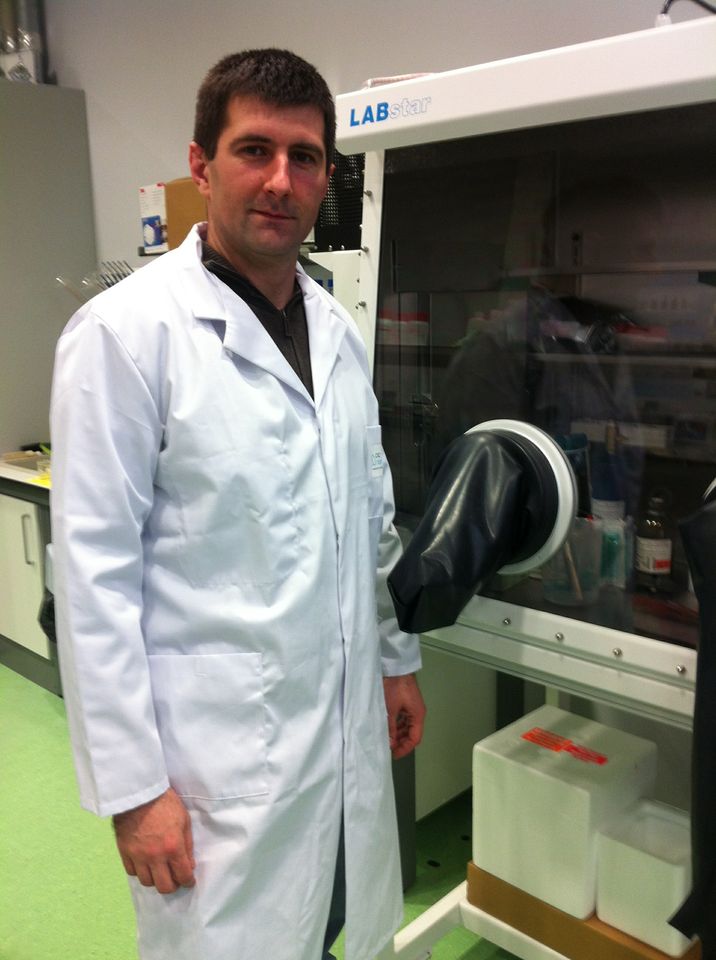Mato Knez: "Nanomaterials with practical applications in the Basque industry"
[Published at www.nanobasque.eu] Technology has evolved so much recently that Basque consumers take for granted that within a few years they will be able to purchase televisions, tablets and computers with ultrafine flexible screens that will be able to be rolled up.

What it is not so known is that CIC nanoGUNE, in San Sebastián, is studying some of the technologies that will make these and other applications possible in the future. One of the groups dedicated to this type of research is the Nanomaterials Group directed by the Croatian Mato Knez, an Ikerbasque scientist with a passion for materials, who not only centres on research but also on the application of technological advancements.
“New materials are everywhere, in this bottle, in this chair, …”, he assures while he points his eyes at dozens of examples of new materials in the few metres of his office. “Research in nanomaterials must help solve economic, environmental and sustainable problems, as an example”, he affirms.
Since he began his trajectory as leader of the Nanomaterials Group, for a little under a year, Mato Knez has initiated conversations with some 15 companies to open lines of collaboration and apply the technologies they research on to the products of these companies. In his belief, this should materialise into “some 3 or 4 concrete projects”. This initiative is perfectly in line with one of the purposes of CIC nanoGUNE: to transfer cutting-edge knowledge in nanotechnology to Basque industry in order to increase its competitiveness.
The group he directs studies mainly three fields: the deposition of fine coats, hybrid materials and bio-organic materials, technologies with possible applications in sectors such as electrical, energy or the biomedical industry. The removal of fine coats of nanometric scale thicknesses is a technology with great potential which can be applied, for example, in the production of flexible electronics, the production of batteries with greater storing capacity or an improvement on present lighting technology. With the aim of finding answers in this last field, the group directed by Knez is already collaborating with Osram, one of the multinational companies which dominates the world illumination market.
“As for hybrid materials, they combine some characteristics of inorganic materials and organic materials, to obtain a result which adapts to the desired needs”, states Knez. And adds: “I believe that this field is one of the most significant for the future of materials science”.
ATTRACTION OF LEADING RESEARCHERS
“During World War II the science of materials became one of the driving forces of the industry and, during the following decades, countries like the US and Germany became leaders in the field. 20 or 30 years ago a nanoscale revolution occurred and the Basque Country is doing a very good job in the attraction of leading researchers in diverse fields of the materials science”, considers Knez.
In the Basque Country, the two technology corporations, Tecnalia and the Alianza IK4, as well as the Polymat Institute, have created a powerful research sector in the science of materials. Mato Knez considers it to be key to take advantage of the cooperation of all institutions to increase opportunities.
“It is necessary for young researchers to learn to collaborate with other authorities”, he affirms. In comparison with Germany, where the inflexibility of the academic world makes the agility necessary to collaborate difficult, Mato Knez believes that this agility makes it easier to build bridges between different centres and institutions. This fact provides Basque research in the science of materials an advantage to position itself on the cutting edge of the sector at an international level.
